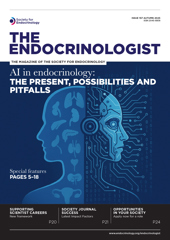In this review, Jamal Belkhouribchia explores how medicine is entering a transformative era, driven by the rapid rise of artificial intelligence (AI). Once considered futuristic, AI is now becoming essential in clinical practice, particularly in endocrinology, where it is redefining how diseases are diagnosed, monitored and managed.
From diabetes care to thyroid diagnostics, AI technologies such as machine learning and deep learning are enhancing diagnostic accuracy and enabling real-time, personalised treatment decisions. Tools powered by AI can now detect thyroid nodules, adrenal tumours and even rare disorders, such as acromegaly, with expert-level precision. Beyond diagnostics, AI is streamlining clinical workflows, improving patient outcomes and supporting clinicians in decision making. In diabetes care, for instance, AI systems are already optimising insulin dosing, based on continuous glucose monitoring and lifestyle data. However, challenges remain. Algorithm transparency, data bias and ethical oversight must be addressed to ensure safe integration.
As the author writes, AI is not replacing endocrinologists: it’s becoming a powerful clinical ally in delivering faster, smarter and more personalised endocrine care.
Read the full article in Frontiers in Endocrinology 16 https://doi.org/10.3389/fendo.2025.1513929





